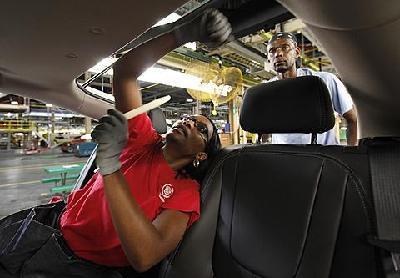Since the economic recession in 2008, some US companies that historically depend on the domestic market started looking elsewhere for business. In Southern California, organizations that help businesses have been encouraging them to go global to boost their bottom line. There are reasons why most American businesses do not export their products.

California-based Tystar sells a special type of furnace. It gets so hot that it can cook the silicone components that go in computers and cell phones. The company assembles these furnaces in Los Angeles and sells them within the United States and overseas.
Jim Smith manages the business development side of Tystar. He says in the last four to five years, the company started focusing more on establishing itself globally, in markets as far away as China, Singapore and South Korea. During that time, exports grew from 20 percent to half of Tystar's business.
Smith says without overseas clients, the economic recession would have hurt the company. But he says developing an international client base was not easy.
"You have a language barrier that's your first challenge. Every place in the world does business differently than we do business in the United States," Smith noted.
Language and cultural barriers are not the only hurdles that discourage businesses from going global. Vance Baugham, president of the World Trade Center Association of Los Angeles and Long Beach, says companies need extra capital to export. He says many US businesses are small and have limited resources.
"When a company is small, all of its resources are usually used to the max," Baugham explained. "In order to find the resources for taking on a global market that is the number one difficulty for them."
Baugham says this is one of the main reasons why less than 15 percent of US businesses enter the global market. Yet despite such difficulties, the drop in domestic demand caused by a tough economy has motivated some US companies to look abroad.
Jim MacLellan is the director of trade development at the Port of Los Angeles. "Companies have to look to diversify their markets away from the domestic economy. And 95 percent of the world's consumers are actually outside the United States." For now, US-based companies seeking to sell products overseas have an advantage. MacLellan says the weakened dollar makes US exports less expensive relative to goods sold in other currencies. A decade ago, about 20 percent of the Port of LA's cargo were exports. Now exports are up to 34 percent.
In Southern California, the Port of Long Beach experienced an almost 50 percent increase in exports in the last ten years. Businesses located in the Los Angeles area on the west coast have the advantage of being close to these ports, and an international airport, making it cheaper to send products overseas.
Traditionally, small companies expanded their businesses slowly, first selling locally, then regionally before considering competing in the global marketplace. Vance Baugham says he is now seeing a new trend.
"Some of the smaller companies are going from local sales to the global market right away." Baugham added.
Baugham says he is also seeing a changing trend in imports. With the price of fuel going up and the cost of overseas labor increasing, it is more expensive to produce items and ship them to the United States. Baugham says countries such as China are looking at manufacturing products within the US to keep costs down.
furnace: an enclosed chamber in which heat is produced to generate steam, destroy refuse, smelt or refine ores, etc. 熔爐
US job growth grinds to a halt in August
US stocks recover after plunging on Bernanke speech
Global stocks fall on US recession, European debt worries
Debt, recession worries bring volatility to world markets
(來源:VOA 編輯:崔旭燕)
